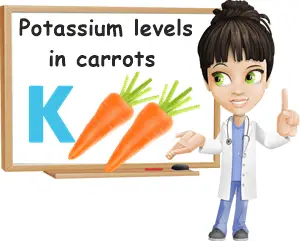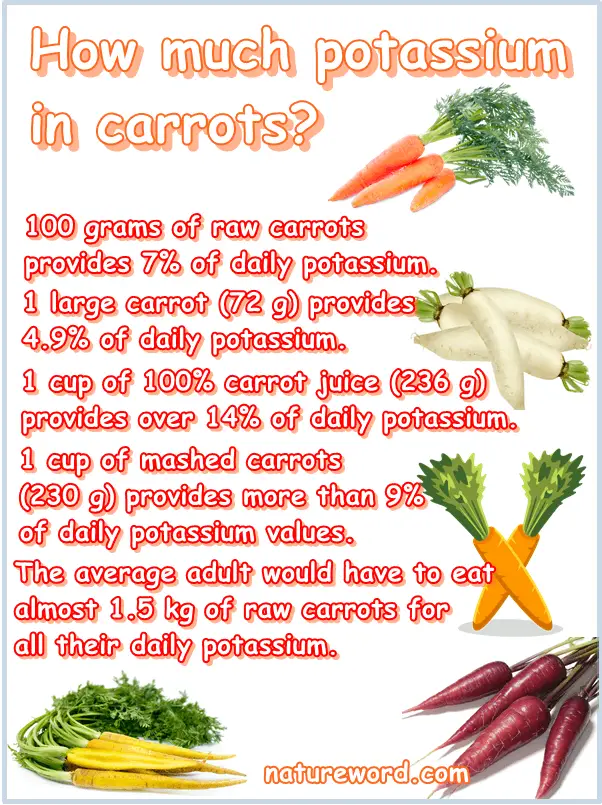How much potassium do you get from eating carrots? What is the potassium content of raw carrots vs cooked carrots vs carrot juice? Are carrots naturally potassium rich foods? How much potassium is there in carrots compared to bananas, avocado, spinach, broccoli and other foods? How many carrots do you have to eat to get your daily potassium?

How much potassium in carrots?
- 100 g (grams) of raw carrots has 320 mg (milligrams) of potassium.
- 1 cup of grated raw carrots at an estimated weight of 110 grams a cup has 352 mg of potassium.
- 1 cup of raw carrot slices at an estimated weight of 122 grams a cup has 390 mg of potassium.
- 1 cup of chopped raw carrots at an estimated weight of 128 grams a cup has 410 mg of potassium.
- 1 large carrot at an estimated weight of 72 grams has 230 mg of potassium.
- 1 regular carrot, medium size, at an estimated weight of 60 grams has 192 mg of potassium.
- 1 small carrot at an estimated weight of 50 grams has 160 mg of potassium.
- 1 baby carrot at an estimated weight of 10 grams has 32 mg of potassium.
- 100 ml (milliliters) of 100% carrot juice has 292 mg of potassium.
- 1 ounce of 100% carrot juice, equivalent to 30 g, has 87.6 mg of potassium.
- 1 cup of 100% carrot juice, equivalent to 236 grams, has 689 mg of potassium.
- 100 grams of boiled and drained carrots provides 235 mg of potassium.
- 100 grams of canned, drained carrots provides 179 mg of potassium.
- 1 cup (228 grams) of mashed canned carrots (drained) provides 408 mg of potassium.
- 100 grams of frozen carrots, cooked, provides 191 mg of potassium.
- 1 cup (230 grams) of frozen carrots, cooked and mashed, provides 439 mg of potassium.
Are carrots high in potassium?
Carrots don’t make the list for potassium rich foods. The average content of potassium in carrots levels at 7% of daily values for the average adult for 100 grams, which is a good amount of potassium at best. Foods that are highest in potassium are nuts and seeds, and some vegetables like broad beans or fava beans, chard, beet greens or beetroot leaves whose potassium content ranges from 14% of daily values to 23% of daily values per 100 grams.

How high in potassium are carrots?
- 100 grams of raw carrots provides 6.8% of the daily potassium intake for the average adult, estimated at 7%.
- 1 cup of grated raw carrots (110 grams) provides 7.5% of daily potassium values.
- 1 cup of raw carrot slices (122 grams) provides 8.3% of daily potassium values.
- 1 cup of chopped raw carrots (128 grams) provides 8.7% of daily potassium values.
- 1 large carrot (72 grams) provides 4.9% of daily values.
- 1 regular carrot, medium size (60 grams) provides 4% of daily values.
- 1 small carrot (50 grams) provides 3.4% of daily values.
- 1 baby carrot (estimated weight: 10 grams per carrot) provides 0.68% of daily values.
- 100 ml (milliliters) of 100% carrot juice provides 6.2% of daily values.
- 1 ounce of 100% carrot juice (30 g) provides 1.86% of daily values.
- 1 cup of 100% carrot juice (236 grams) provides 14.66% of daily potassium.
- 100 grams of boiled and drained carrots provides 5% of daily values.
- 100 grams of canned, drained carrots provides 3.8% of daily values.
- 1 cup (228 grams) of mashed canned carrots (drained) provides 8.68% of daily values.
- 100 grams of frozen carrots, cooked, provides 4% of daily values.
- 1 cup (230 grams) of frozen carrots, cooked and mashed, provides 9.345% of daily potassium.
How many carrots do you have to eat to get your daily potassium?
To get your entire daily potassium from carrots alone, you would have to eat 1.470 kg of raw carrots a day. However, this is an excessive intake and doing so would deprive your diet of much needed variety. Instead of relying on just one food source for the mineral, you can boost your potassium intake by pairing different foods.
For example, you can make a raw carrot and apples salad and work your way up to 10% daily potassium from just 100 grams of carrot and a little over 100 grams of apple. You can make everything more appealing to the eye by pairing red carrots with apples with red skin and pulp.
Or you can drink 200 ml of carrot juice and orange juice, 100 ml of each, and get a little over 10% daily potassium. You can also choose purple or black carrots for the juice.
A side dish with 100 grams of carrot and 100 grams of broccoli gets you 13.5% of all the potassium you need in a day. For a more striking color on your plate, go for yellow carrots to really make the green broccoli stand out. A serving of carrot and avocado mash made from 1 large carrot (72 grams) with 50 grams of avocado can get you over 10% of your daily potassium.
Carrots potassium content vs other foods
Potassium content estimates per 100 grams of carrots and other foods:
- Carrots: 7% of daily values for the average adult
- Blueberries: less than 2%
- Apples: 2%
- Oranges: 4%
- Orange juice: 4%
- Green beans: 4%
- Apricots (fresh): 6%
- Broccoli: 7%
- Beets: 7%
- Butternut squash: 7%
- Brussels sprouts: 8%
- Banana: 8%
- Avocado: 10%
- Spinach: 12%
- Brazil nuts: 14%
- Cashews: 14%
- Almonds: 15%
- Beet leaves: 16%
- Fava beans (broad beans): 23%
- Apricots (dried): 25%
See also :
Why eat carrots to get your daily potassium?
Carrots are not high in potassium, but do provide good levels of the essential nutrient: 7% of the recommended daily intake of potassium for the average adult in every 100 grams. But there are benefits to getting your potassium from carrots specifically, even though they aren’t the highest potassium foods.
The biggest benefit is that carrots are perfectly safe to eat, and you can eat them everyday without risks or side effects. Not to mention that the serving size for carrots is bigger than for other foods: 75 grams to 1 cup (110 grams to 130 grams a cup). By comparison, you can only eat 25 to 30 grams of nuts or seeds.
And even if you do eat too many carrots for too many days in a row, which is unlikely, at most your skin might get a little orange – the condition is called carotenosis or carotenodermia and it’s caused by carotenoids, the pigments that give carrots their orange (or red) color, accumulating in the upper layer of the skin. However, the condition is both harmless and completely reversible – you just have to stop eating carrots, and other orange and red foods, for a little while.
Other foods that are rich sources of potassium, such as some green vegetables, have smaller serving sizes. This is because, after a certain amount, they come with side effects and adverse reactions thus offsetting their benefits. For example, green leafy vegetables such as beet leaves and chard are extreme sources of vitamin K which can predispose to blood clots when consumed excessively.
Nuts and seeds are some of the highest potassium foods, but the serving size is only 30 grams because they are just too high in fat, unsaturated and saturated fat, and high in calories. Eating too much fat leads to weight gain. Excess body weight in turn causes high blood cholesterol levels and increases risks of associated cardiovascular disease as well as type 2 diabetes risks.
A serving of 100 grams of most nuts and seeds typically provides up to 14% of daily potassium for the average adult, but if you were to eat the recommended serving size of 30 grams, you would only get a little over 4% of your daily potassium. Whereas the minimum serving for carrots, which is 75 grams, would get you over 5% of your daily potassium. Not to mention you can eat more than that.
